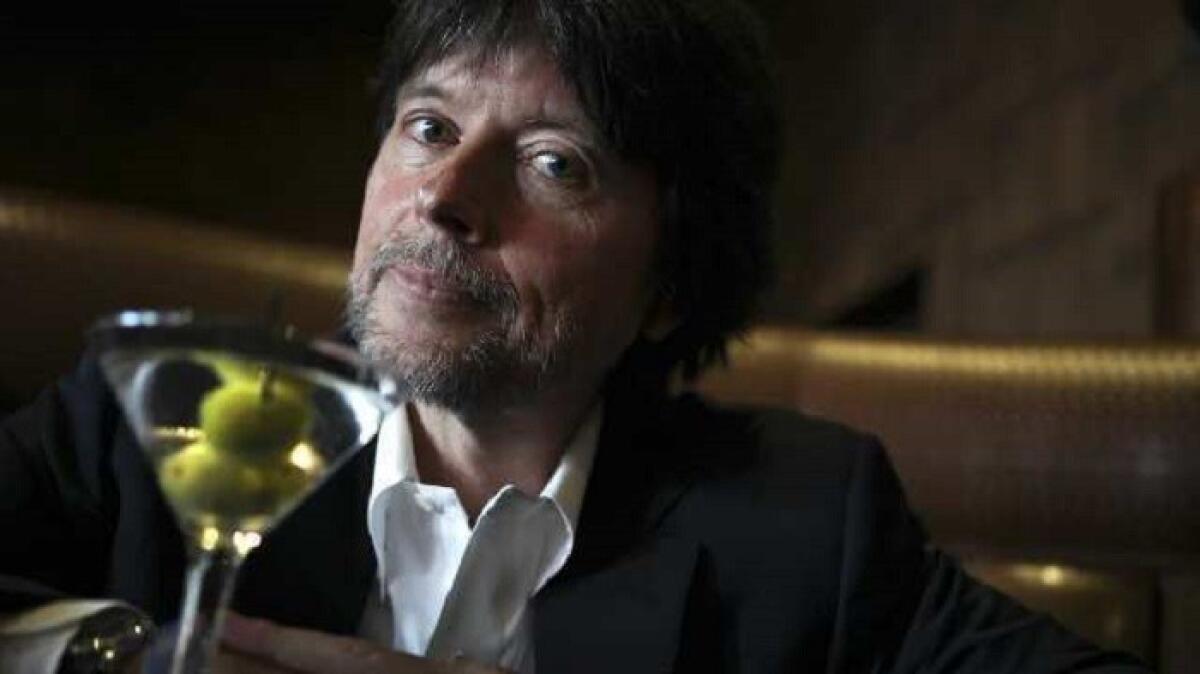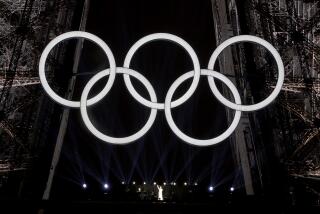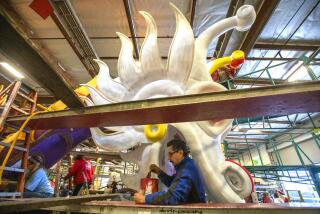Rose Parade grand marshal, filmmaker Ken Burns, will be watching in person for the first time

Documentary filmmaker Ken Burns
Ken Burns already has a trophy case stuffed with Emmys, Grammys and honorary doctorates. But now he’s about to add another honor: grand marshal of the Rose Parade.
The 62-year-old documentarian behind such PBS productions as “The Civil War,” “Jazz,” “Baseball” and “The Roosevelts” will oversee the annual parade through the streets of Pasadena on New Year’s Day, joining a list of past marshals such as Shirley Temple, Richard Nixon and Bob Hope. He spoke by phone from his office in New Hampshire:
So you’ve never seen the Rose Parade in person?
I have not. I’ve always done what 99.99% of Americans do, which is wake up on New Year’s Day, hopefully not hung over, and watch the Rose Parade and then watch the Rose Bowl.
SIGN UP for the free Classic Hollywood newsletter >>
But you’re not a Pasadena newbie, we hear.
I’ve spent a lot of time in Pasadena over the last 35 years. Coincidentally I just finished a film on Pasadena’s own Jackie Robinson, who grew up in Pasadena. That will be broadcast on PBS in April.
The theme of this year’s parade is “Find Your Adventure.” That is not that far from “Find Your Park.” Two thousand sixteen is the 100th anniversary of the creation of the National Park Service. In 2009, I produced a long series film that was very popular called “The National Parks: America’s Best Idea.” It wasn’t a nature film, it wasn’t a travel log, it wasn’t telling you what inn or lodge to stay at. It was the story of how these utterly American inventions, the national parks, came into existence.
You are America’s consummate video historian. Have you thought about what the history of the Rose Parade means?
There’s an energy that was set off at the creation of the United States. The Rose parades are an extension of that. It’s watching for ourselves the best of us, our efforts. It’s almost Zen, this Rose Parade, if you think about it. That hundreds of thousands of man and woman hours go into creating these magnificent floats that will last but for a day. That bands practice for weeks and weeks and weeks to be lucky enough to be chosen to come and play in the Rose Parade. That tens of thousands of people in some way volunteer their efforts, to celebrate in some ways just the best of us.
What are your duties as grand marshal? We assume there’s nothing military involved.
No. It is, as most grand marshals are, being involved and swept up in and generously included in a number of events that occur over the last few days, waning days of 2015. Then, of course, highlighted by being part of [the parade], along with my family, my wife, Julie, and my two youngest daughters, Olivia and Willa. Then my oldest daughter, Sarah, and her husband, Dave, and her two kids, my granddaughter Lyla and my grandson Finn. It’s a family affair, and we’ll all be there and participating in it. I’m involved in the coin toss at the beginning of the Rose Bowl game.
Often your films uncover some of the less attractive sides of American history. What did you uncover about Robinson, who famously broke the color barrier in pro baseball?
His story resonates with today. Robinson had police encounters, just like the youth of today. He was stopped because he and a friend were singing a current jazz song that the cops took offense at. He helped integrate the swimming pools in Pasadena. They had what was called International Day where the Mexicans and Asians and blacks were allowed to swim, at which point the city fathers, to the great relief of the white citizens of Pasadena, drained the swimming pool and cleaned it and filled it up for the other six days where only whites could use it. Jackie Robinson’s brother won the silver medal at the ’36 Olympics in Berlin, his older brother Mack. He came back and couldn’t find work in the midst of the Depression as an African American and would often be found sweeping the streets of Pasadena with his Olympic jacket and medal on. The whites burned crosses on his lawn, and a little kid across the street yelled obscenities at him, at his father, and Jack Robinson, the grandson of a slave, shouted right back and threw the rocks right back. It’s a dynamic, fluid, interesting, passionate story that is every bit as American as Abraham Lincoln’s story.
You’ve said that your 10-part history on the Vietnam War will reframe people’s understanding of the conflict. Give me an example of one revelation.
OK. If I put a gun to your head and said, who was the head of our enemy, North Vietnam, what would you say?
Was it Ho Chi Minh?
That’s what 99.99% of all intelligent people will say. But he was a figurehead. That’s who our government thought was running things, but it was somebody else.
Who?
You will find out when you see our film.
All told, you have 10 projects right now in various stages of completion. Clearly you need to find more to do.
I know. I feel kind of lazy here.
------------
‘127th Annual Tournament of Roses Parade’
Where: KTLA
When: 8 a.m. Friday
Rating: TV-G (suitable for all ages)
More to Read
The biggest entertainment stories
Get our big stories about Hollywood, film, television, music, arts, culture and more right in your inbox as soon as they publish.
You may occasionally receive promotional content from the Los Angeles Times.











